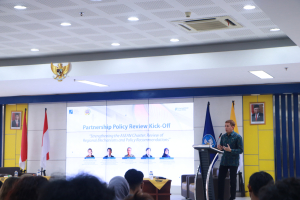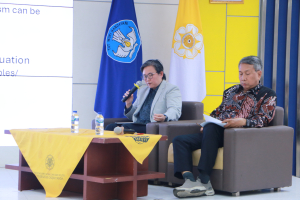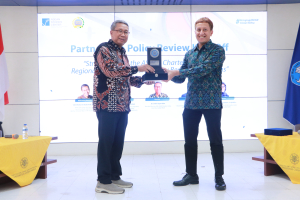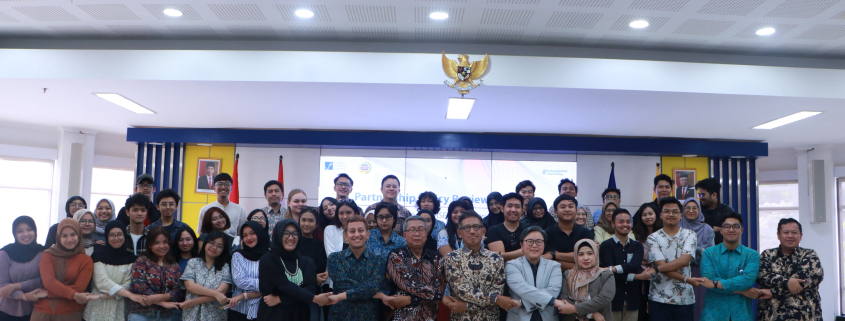Partnership Policy Review Kick Off – “Strengthening the ASEAN Charter: Review of Regional Mechanisms and Policy Recommendations”
In the last few decades, ASEAN has experienced a shift from a state-oriented policy to a people-oriented one. This has become momentum for strengthening the economic, political-security, and socio-cultural pillars. To generate a broader measure of this issue, the ASEAN Studies Center and the Ministry of Foreign Affairs of the Republic of Indonesia are hosting a Partnership Policy Review Kick-Off on “Strengthening the ASEAN Charter: Review of Regional Mechanisms and Policy Recommendations”
“The world is much different than what it was. and when the organization established its charter in 2007, and the situation at that time was also different than what it was meant when ASEAN was first created,” said Vahd Nabyl A. Mulachela, Director of the Center for Policy Strategy for the Asia Pacific and Africa Region. ASEAN is one of the three main focuses in the policy agenda launched by the Indonesian Ministry of Foreign Affairs this year.

The existence of pressing issues such as the Myanmar conflict, global power rivalry and its economic-political implications, and the development of multilateralism among dialogue partners then became the background for the urgency of reviewing the ASEAN Charter.
H.E. Ambassador Chilman Arisman, a diplomat from the ASEAN General Directorate, Ministry of Foreign Affairs of the Republic of Indonesia, explained that the relevance of the ASEAN Charter is currently facing challenges after being formed many years ago. “The ASEAN Charter aims for the organization to have a definite legal basis, clear rules, and an effective organizational structure. Meanwhile, currently, we see challenges faced due to changes in the political and economic conditions of ASEAN countries,” he said.
On the way forward, H.E. Ambassador Chilman Arisman said there are at least four things that ASEAN has to do: first, the ASEAN charter needs more strengthening in institutional frameworks and mechanisms in regards to political commitment and recontextualization; second, new approaches to the reform decision-making process; third, enhance collaboration with various stakeholders; and last, push member states political will to implement the reformations.
“Indonesia, during its tenure as ASEAN Chair in 2023, has tried to rebuild trust among countries and restore joint commitment through the 43rd ASEAN Summit in Bali. We need to recontextualize based on the changes in political dynamics that exist,” Chilman explained.
Agreeing with Chilman’s opinion, Dr. Lina Alexandra, a representative of CSIS, emphasized the importance of the sustainability of the ASEAN organization. “Our mission is to maintain and keep ASEAN alive and growing. Then what is more important is to make ASEAN relevant and credible as a regional organization,” she said. Lina divided the challenges of the ASEAN Charter into two problems, namely internal, regional, and external. She said the Myanmar conflict is only one of the problems that the current ASEAN Charter cannot solve.

The current ASEAN Charter is 17 years old and has not been reviewed at all. In fact, ideally, an agreement is legally reviewed every five years, meaning that the ASEAN Charter should have been reviewed three times since it was first agreed upon. This problem is not the responsibility of just a few countries, but all ASEAN member countries. “The ASEAN Charter is not a document that is just placed in a cupboard but is a guide that determines the direction of policy. Also as a joint commitment in facing global challenges,” said Dr. Lina.
The Executive Director of the ASEAN Studies Center, Dr. Dafri Agussalim, highlighted the leadership crisis in ASEAN. According to him, ASEAN needs a strong and visionary leader to overcome this problem. “ASEAN has so far relied on informal management in solving problems. However, strong leadership and good mechanisms are the keys for ASEAN to overcome future challenges,” said Dr. Dafri.

The discussion on the review of the ASEAN Charter by the Center and the Minister is expected to be the first step for ASEAN member countries to review the agreement. In addition, strengthening this commitment can help realize peace, justice, and strong institutions, which are some of the points of the 16th Sustainable Development Goal, and reflect and strengthen its commitment to facing regional and global challenges.




Leave a Reply
Want to join the discussion?Feel free to contribute!